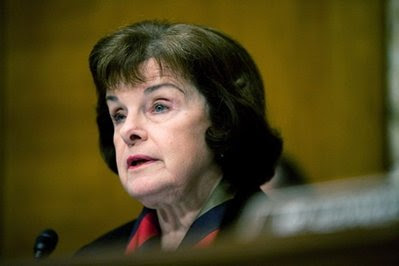Do Progressives Vote To Abolish The Estate Tax? I Asked Feinstein And Boxer
>
In the run-up to a vote on the Senate budget on March 23, dozens and dozens of pointless, ideological amendments were offered late into the night. I recall Jim Inhofe offering some kooky black helicopter amendment about the UN coming to take away our guns after 4 AM as the whole absurd process was finally winding down. Earlier in the evening, however, North Dakota and Virginia corporate whores John Thune and Mark Warner offered separate amendments to repeal the estate tax. Thune's was more radical and it failed 46-53, all Republicans but Susan Collins (R-ME) voting for it and all Democrats except far right-wing conservatives Max Baucus (MT) and Joe Manchin (WV) voting against it. Warner's bill wasn't much better and, shockingly, it passed 80-19. 80-19. A quick mathematical calculation shows that that means most of the Democrats joined all of the Republicans in voting for it. Most of the Democrats; more than half. And that included my two senators, the once-progressive and now increasingly senile and, sadly, useless Barbara Boxer and the always relatively conservative Dianne Feinstein. There really should be a retirement age on Senators like there are on people with real jobs.
Anyway I wrote very polite letters to Barbara and Dianne asking them to explain why the voted "to repeal or reduce the estate tax, but only if done in a fiscally responsible way." Boxer, to whom I used to write substantial campaign checks, hasn't responded. But Feinstein, who I've never even voted for once, going all the way back when she ran for mayor of San Francisco, did write a reply:
Anyway I wrote very polite letters to Barbara and Dianne asking them to explain why the voted "to repeal or reduce the estate tax, but only if done in a fiscally responsible way." Boxer, to whom I used to write substantial campaign checks, hasn't responded. But Feinstein, who I've never even voted for once, going all the way back when she ran for mayor of San Francisco, did write a reply:
Dear Mr. Klein:What does that mean? And how does it relate to the question I asked her about Warner's amendment to repeal or reduce the estate tax" which she had just voted for the night before? A multimillionaire with a sizable estate herself, was she more confused than progressive Democrats like Tammy Baldwin (WI), Sherrod Brown (OH), Al Franken (MN), Tom Harkin (IA), Jeff Merkley (OR), Tom Udall (NM) and Sheldon Whitehouse (RI)-- not to mention Independents Bernie Sanders (VT) and Angus King (ME)-- who had enough wits to vote NO?
Thank you for your letter regarding the estate tax. I appreciate hearing from you, and I apologize for the delay in my response.
As you may know, Congress voted on January 1, 2013 to pass the American Taxpayer Relief Act (Public Law 112-240), which temporarily averted sequestration spending cuts required by the Budget Control Act (Public Law 112-25) and prevented the implementation of significant tax rate increases on the middle class. This legislation also includes a modest increase in the top rate for the estate tax, from 35% to 40%, but maintains the $5.12 million exemption, adjusted for inflation, that was created in 2010. This provision averted an increase in the top tax rate to 55% and a reduction in the exemption level to $1 million, which was scheduled to go into effect at the start of 2013.
I initially supported a higher top estate tax rate of 45% and lower exemption of $3.5 million. According to the Tax Policy Center, under this framework, over 99% of estates would not be taxed. While the rates included in this legislation are somewhat more generous to high value estates, I am pleased that Congress was able to come together and pass legislation to avoid the fiscal cliff and raise revenues. I firmly believe that the modest tax increases on the wealthiest Americans included in this legislation were a necessary part of a balanced approach to debt reduction.
Labels: Dianne Feinstein, estate tax





0 Comments:
Post a Comment
<< Home